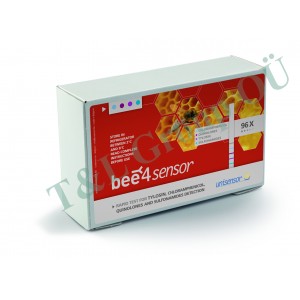Shopping Cart
0 item(s) - 0.00€
Readip - Portable Rapid Test Reader
READIP is a lightweight and portable rapid test reader and the ultimate tool for the qualitative analysis of Unisensor‘s dipstick tests. A laboratory in a small cube of only 4 cm sides. Use it on a truck or in the field. Wherever you need it! Price is 400 EUR!! ..
Bee4sensor - strip test for Tylosin, (Fluoro)-Quinolones, Sulfonamides and Chloramphenicol detection in one single test
Principle
BEE4SENSOR is a multiplex competitive antibody-based assay in dipstick format for the detection of Tylosin, Chloramphenicol, the main Sulfonamides and (Fluoro)-Quinolones in honey. This convenient dipstick format makes testing easy, accurate and cost-effective.
Different methods (“field test” or “lab test”) of this assay allow its use either in-situ or in regulatory and industrial labs of control. This test can be also used at beekeepers or cooperatives levels on a specific batch of honey before mixing in order to avoid the general contamination of all the tank content after blending.
Benefits
- Rapid — Results in 30 minutes (field test) or 90 minutes (lab test)
- Sensitive — Low limits of detection
- Reliable and robust
- Multiple — Detection of more than 18 relevant antibiotics in one single test
- User-friendly — Performable on site or in the lab
- Cost-Effective
- Ecological packaging
Good to Know
Honey is considered as a natural and healthy product. In recent years, antibiotics have been used in apiculture to prevent and treat bacterial diseases including Foulbrood and Nosemosis. Due to their potential risk for human health, the use of antibiotics has been banned by regulating authorities in Europe, USA and many other countries. Despite this prohibition, the presence of drug residues in honey is frequently reported for antibiotics such as Tetracyclines, Sulfonamides, Tylosin, Quinolones and Chloramphenicol. As a consequence the general drug residue surveillance has been increased, underlining a demand for rapid, easy and multiple screening tests for the detection of antibiotics in honey.
The research leading to this product has received funding from the European Community’s Seventh Framework Program (FP7/2007-2013) under grant agreement n°211326.
Write a review
Your Name:Your Review: Note: HTML is not translated!
Rating: Bad Good
Enter the code in the box below:




-160x160.jpg)






 (
(